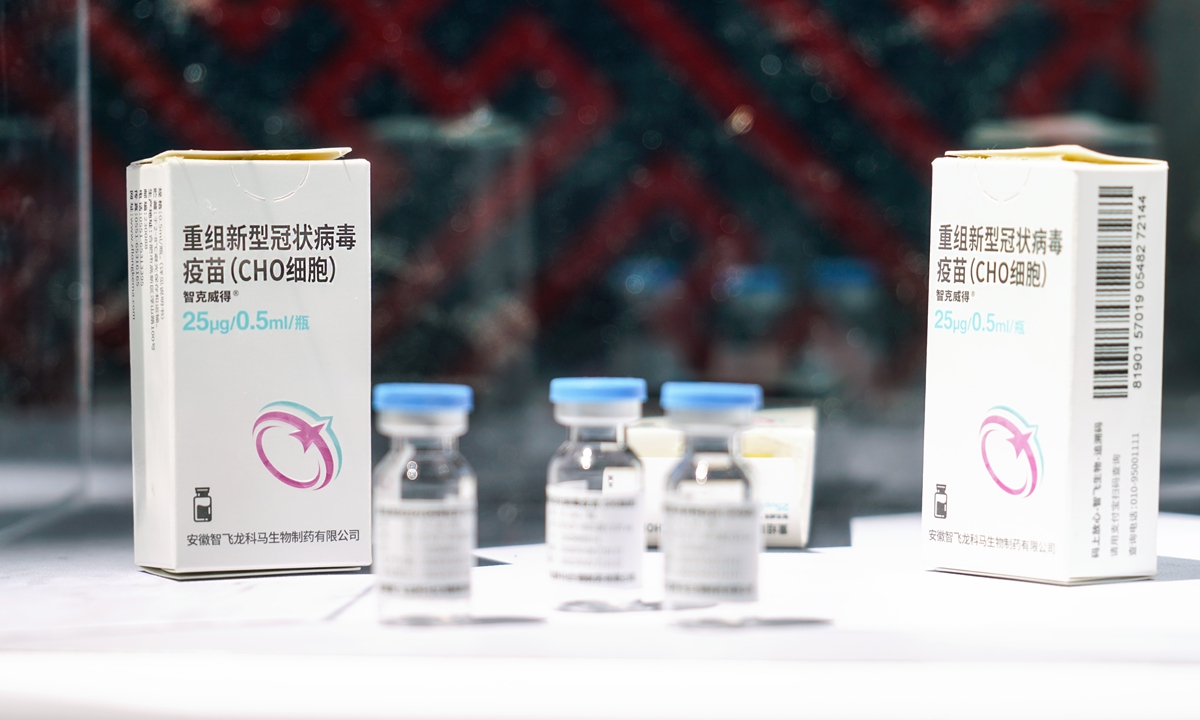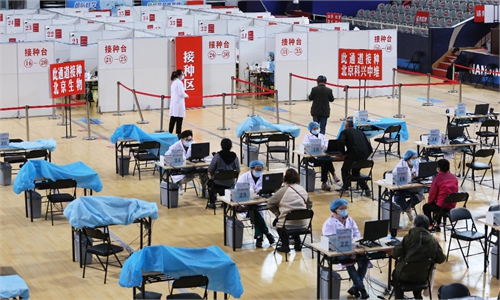
Novel coronavirus vaccine (CHO Cell) produced by Anhui Zhifei Longcom Biopharmaceutical Co Ltd Photo: VCG
Amid flare-ups in Beijing and Shanghai, China’s COVID-19 vaccine manufacturer Zhifei Longcom released encouraging data, which showed that its vaccine is 75.7 percent effective against symptomatic and 87.6 percent effective against severe-to-critical COVID-19 cases for six months following full vaccination.
The company also revealed to the Global Times that it had realized a yearly production capacity of about two billion shots per year while the country is at a crucial stage to build an immune barrier among the public with the elderly group being encouraged to get vaccinated.
The recombinant protein vaccine, ZF2001, was jointly developed by the Institute of Microbiology of the Chinese Academy of Sciences and Anhui Zhifei Longcom Biopharmaceutical Co Ltd. The vaccine’s development was led by Gao Fu, head of the Chinese Center for Disease Control and Prevention.
According to the latest studies, the three-dose ZF2001 regimen had a vaccine efficacy against COVID-19 of 81.4 percent in the short-term follow-up and 75.7 percent in the long-term follow-up.
In the long-term follow-up, vaccine efficacy against severe-to-critical COVID-19 was 87.6 percent and vaccine efficacy against COVID-19–related death was 86.5 percent, the paper said, noting that this proved that ZF2001 would provide fundamental immunity to relieve the pressure on health care facilities that could be overwhelmed by patients with severe-to-critical COVID-19 symptoms.
The results of the latest study were released on the website of the New England Journal of Medicine on Wednesday morning. Between December 12, 2020, and December 15, 2021, a total of 28,904 participants, including 27,065 aged between 18 and 59 years of age and 1839 aged 60 or older, were enrolled and underwent randomized sampling at 32 clinical centers across five countries (China, Uzbekistan, Indonesia, Pakistan, and Ecuador), according to the study.
Among the participants with coexisting medical conditions that were risk factors for severe COVID-19, vaccine efficacy was 61.6 percent. Among younger participants (18 to 59 years of age), vaccine efficacy rose to 76.0 percent, and among older participants (≥60 years of age), vaccine efficacy was 67.6 percent.
ZF2001 also showed high cross-protection against different SARS-CoV-2 variants. The vaccine showed an efficacy against the Alpha variant of 92.7 percent in the short-term follow-up and 88.3 percent in the long-term follow-up; an efficacy against the Delta variant of 81.4 percent and 76.1 percent, respectively; and an efficacy against the Kappa variant of interest of 84.8 percent and 75.2 percent, respectively.
Although the latest study did not present data about the vaccine’s safety and efficacy against the dominating Omicron variant, an earlier study published in Cell in late April said that the research team led by Gao Fu had adopted a new strategy to design a new COVID-19 vaccine that has shown to be highly effective in mice and macaques against infections by the Delta and Omicron strains.
ZF2001, the world’s first approved COVID-19 protein subunit vaccine, was developed and produced from a pre-design concept developed by Gao Fu’s team and approved for emergency use in China, Uzbekistan, Indonesia and Colombia.
The vaccine was approved by Chinese national authorities in February to be provided as booster shots to inactivated vaccines.
The Global Times learned from the Zhifei Longcom on Thursday that the vaccine had been used globally on more than 100 million people and the company had realized a yearly production capacity of about two billion shots per year.
The results of the latest study was released while the cities of Beijing and Shanghai in China are in full swing to fight against the virus and the latter has reported 503 deaths, most of which involved elderly people with severe underlying conditions, as of Wednesday. The results significantly boosted Chinese netizens’ confidence in domestic vaccines and their expectation for more effective shots.



